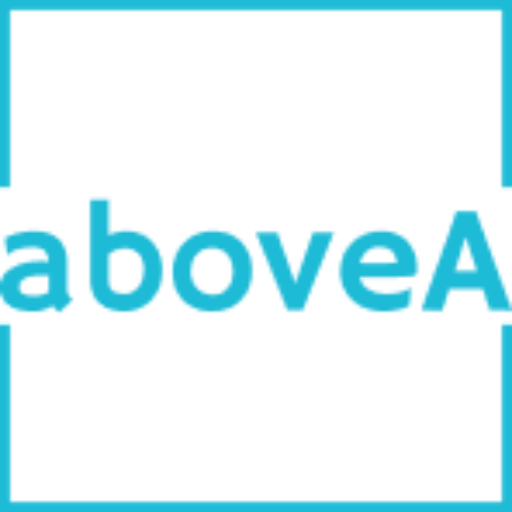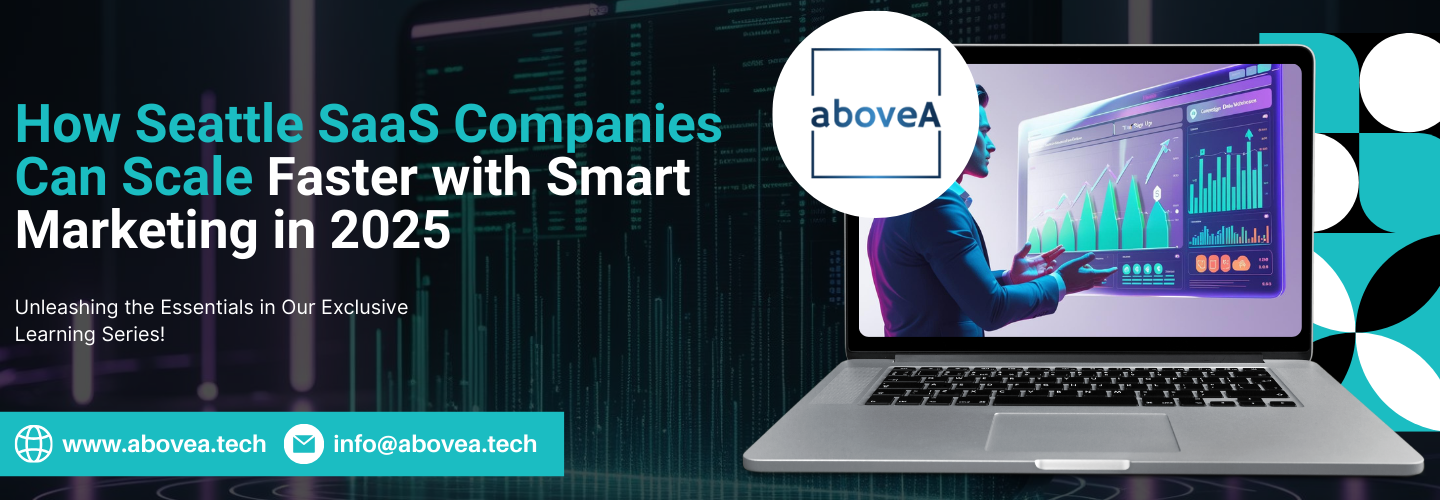
How Can Seattle SaaS Companies Scale Faster with Smart Marketing in 2025?
SaaS product marketing in Seattle has become the lifeline for companies aiming to scale faster in 2025. With the city’s booming tech scene and heavy startup competition, growth requires more than a good product. It requires visibility, credibility, and lead generation that converts. Buyers now search online before contacting sales, compare SaaS solutions side by side, and expect clear proof of value.
This article explores proven SaaS marketing strategies for Seattle companies, ranging from SEO and paid advertising to demand generation, customer retention, and intelligent automation, designed to help SaaS businesses outperform larger competitors and achieve sustainable growth.
SEO and Content Marketing for SaaS Growth in Seattle
SEO for SaaS in Seattle is the foundation of scaling faster. With dozens of startups and enterprise-level SaaS firms competing for attention, ranking on Google is the difference between getting noticed and being ignored. High-intent SaaS keywords such as Seattle SaaS software solutions, SaaS growth services, or enterprise SaaS providers in Seattle drive decision-makers right to your website.
Why SEO Matters for SaaS Visibility
Search intent in SaaS is not about random clicks; it’s about capturing qualified leads. When Seattle companies invest in SaaS content marketing, they create blogs, case studies, and whitepapers that attract buyers looking for solutions, not just product names. Optimizing SaaS landing pages with structured internal linking, schema markup, and localized terms increases conversions. For example, ranking for “Seattle SaaS analytics tool” not only drives traffic but also positions your brand as an industry leader.
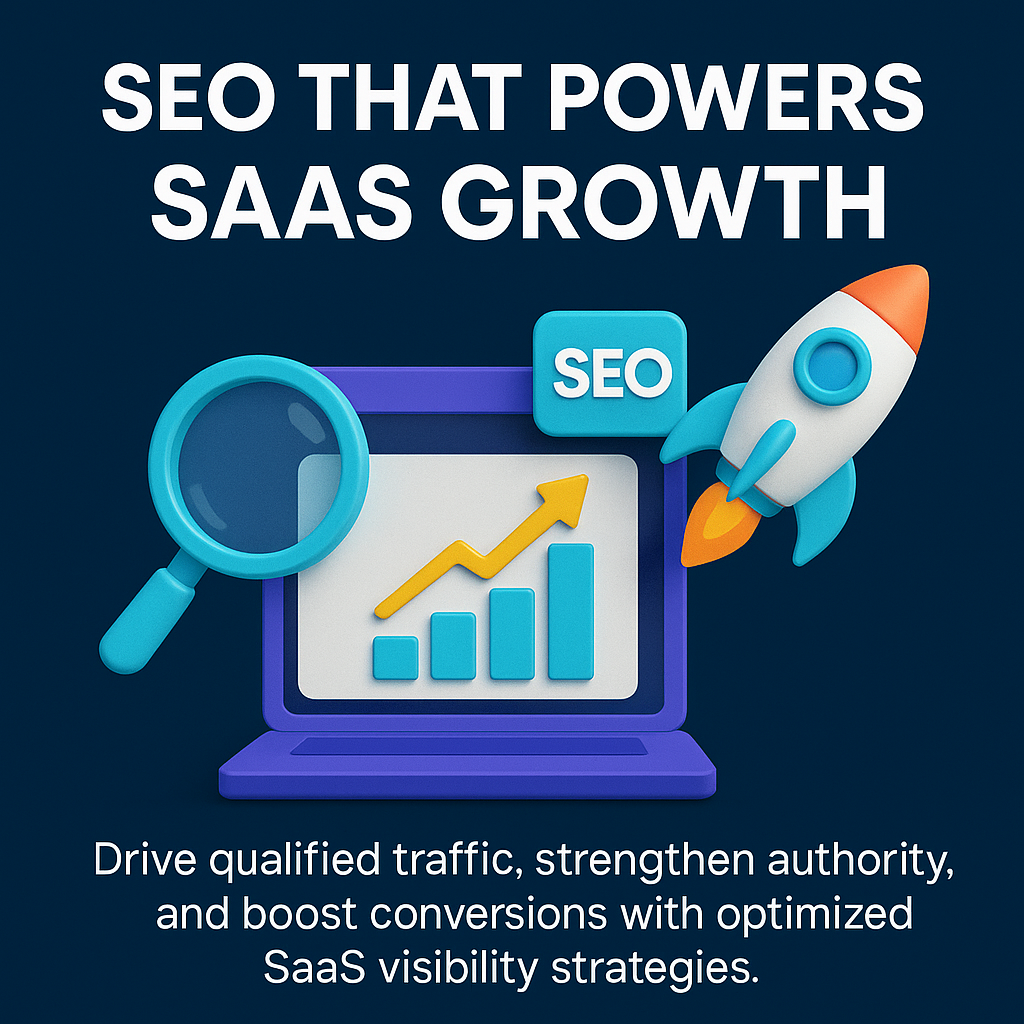
Building Authority with Content Marketing
Content marketing is more than publishing articles. For SaaS companies in Seattle, it’s about creating conversion-driven content that solves pain points. Whitepapers generate leads, LinkedIn thought leadership builds trust, and SaaS product demos shared through blog posts increase sign-ups. By aligning each piece of content with the SaaS funnel – from awareness to decision – you can move prospects seamlessly toward becoming long-term users.
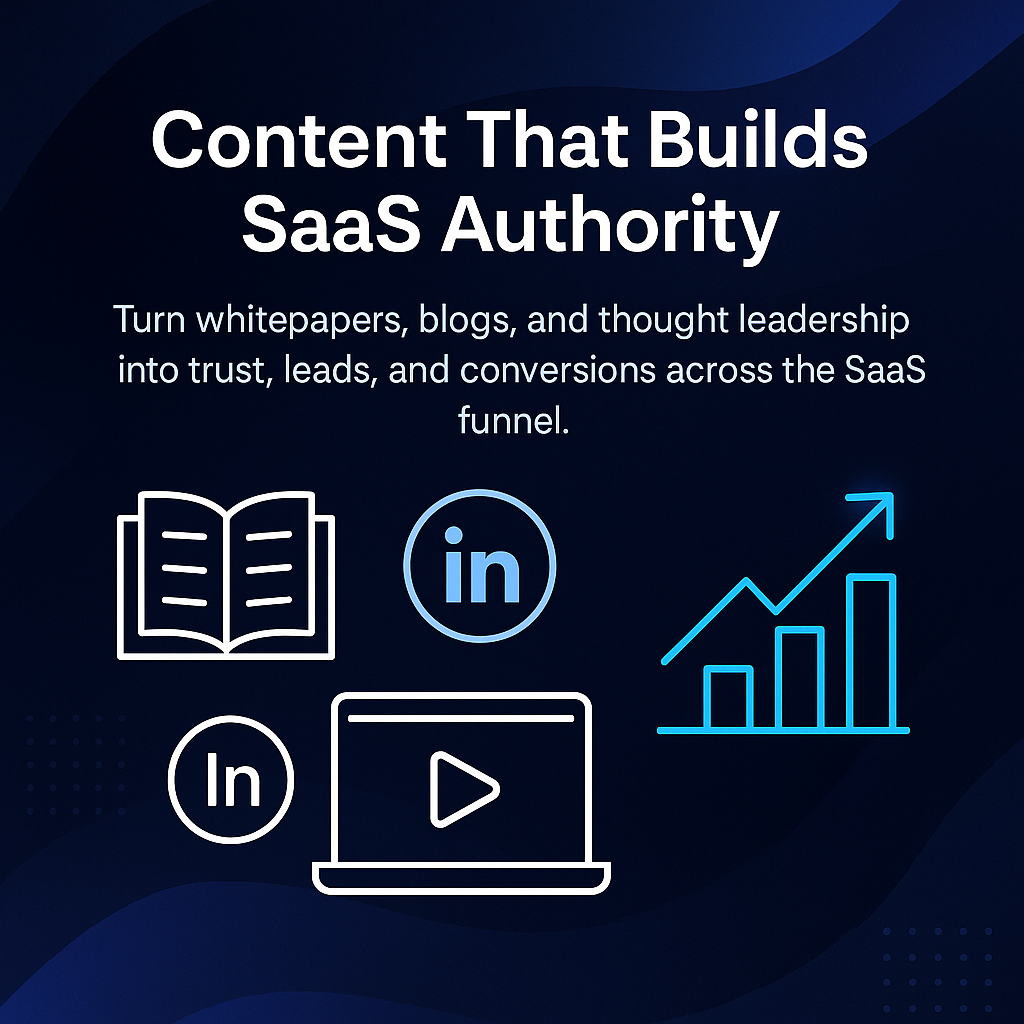
Evergreen Lead Generation for SaaS Growth in Seattle
Evergreen lead generation for SaaS in Seattle involves building systems that consistently deliver qualified leads long after the campaign begins. Unlike one-off ads, evergreen strategies provide a steady flow of signups, demos, and trial users, helping SaaS companies grow consistently in a competitive market.
SEO Content That Works All Year
Search-driven content is the heart of evergreen SaaS growth in Seattle. Articles, case studies, and comparison pages targeting keywords like “Seattle SaaS project management tools” or “best cloud software for startups” bring buyers who are actively searching. By ranking for these high-intent terms, SaaS firms can generate leads 24/7, without paying for every click.
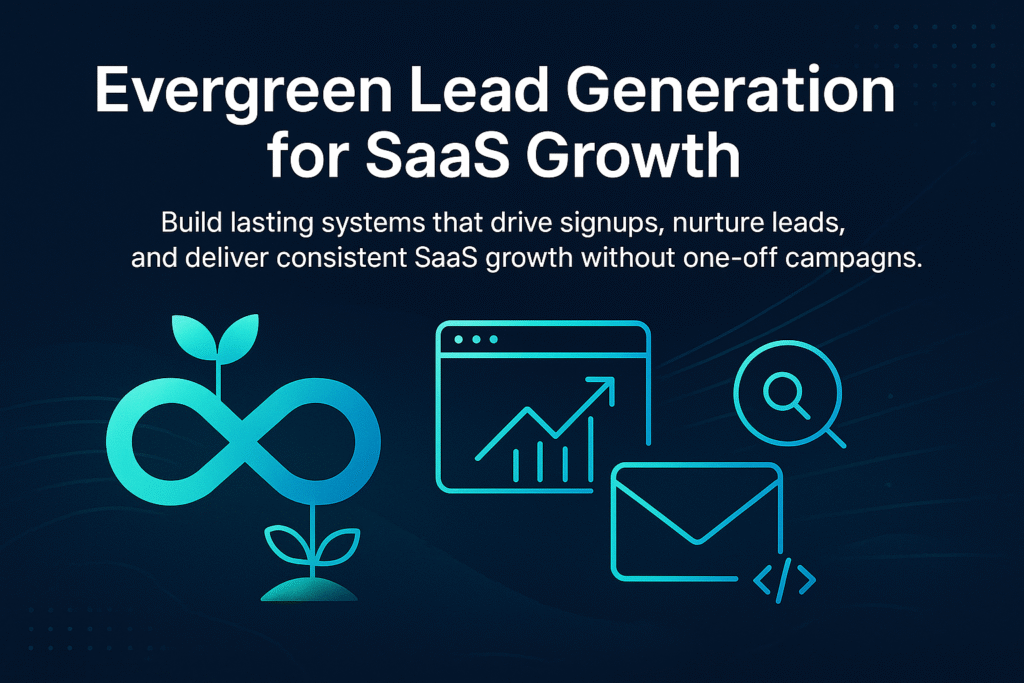
Automated Nurturing That Converts
Evergreen doesn’t stop at traffic – it extends to nurturing. Automated email workflows, gated assets, and free trial offers capture leads and move them down the funnel. A Seattle SaaS company can use tailored onboarding emails or ROI calculators to guide trial users toward paid plans. This consistent, automated approach makes evergreen campaigns a growth engine, not just a one-time tactic.
Paid Ads for SaaS Companies in Seattle
Paid ads for SaaS companies in Seattle deliver instant visibility in a crowded market. Unlike SEO, which compounds over time, SaaS advertising campaigns on Google, LinkedIn, and programmatic platforms capture demand right away. SaaS firms competing in Seattle need precision targeting to avoid wasted budget and instead reach decision-makers actively searching for solutions.
Google Ads for High-Intent SaaS Buyers
Google Ads remain a top driver for SaaS growth in Seattle. Targeting phrases like SaaS project management Seattle or enterprise SaaS solutions in Washington captures buyers already in evaluation mode. With proper keyword bidding strategies and optimized landing pages, SaaS companies can achieve substantial ROI. Retargeting visitors who abandoned demo sign-ups or free trials also increases conversions.
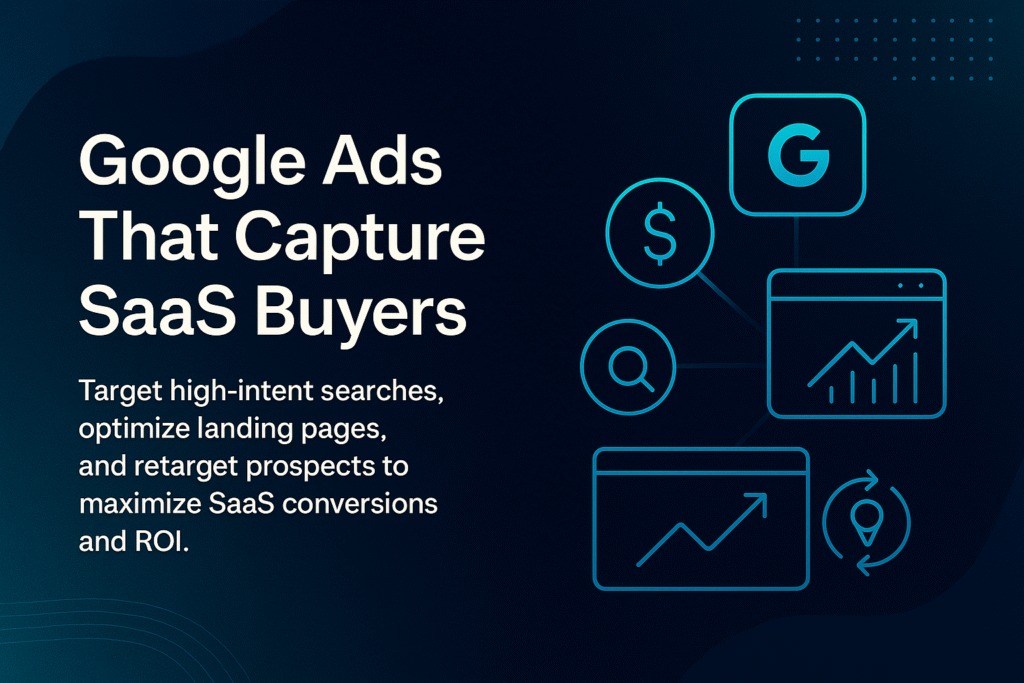
LinkedIn and Social Ads for SaaS Awareness
Seattle is home to a highly tech-savvy audience, and LinkedIn Ads offer unmatched targeting. SaaS companies can segment by job title, company size, or even Seattle-based industries like biotech and fintech. Social ads on platforms like Facebook and Instagram expand awareness, especially for SaaS startups with lower brand recognition. Together, these channels build brand trust while generating sales-ready leads.
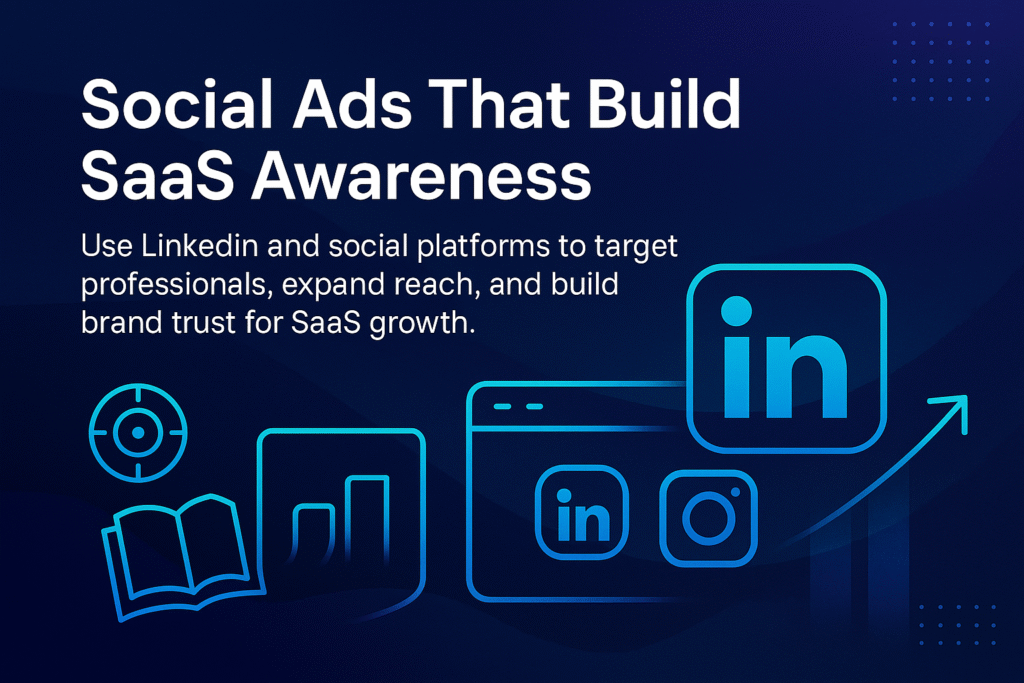
Conversion Optimization for SaaS in Seattle
Conversion optimization for SaaS in Seattle is about turning clicks into paying customers. With so many SaaS companies fighting for attention, a website or landing page must do more than attract visitors – it must convert them. From A/B testing sign-up flows to refining trial-to-paid upgrades, every improvement makes a difference.
Improving SaaS Landing Page Performance
Strong landing pages drive SaaS growth in Seattle. Pages optimized with clear CTAs, benefit-driven headlines, and customer proof points convert far better. SaaS companies should test free trial forms, pricing pages, and onboarding messages to reduce drop-offs. Optimizing mobile performance and load speed also increases conversions for busy Seattle professionals who browse on the go.
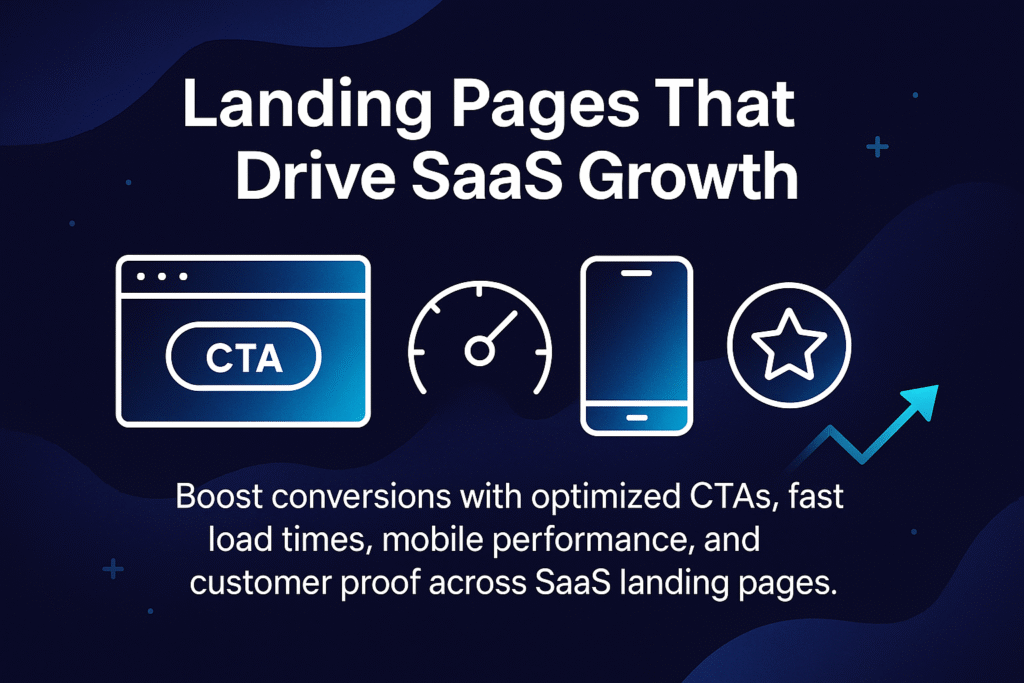
Using Data to Improve SaaS Conversions
SaaS companies in Seattle thrive when decisions are backed by analytics. Tracking user behavior through heatmaps, funnel analysis, and CRM integration reveals where potential customers get stuck. With tools like Google Analytics 4 and product analytics, SaaS teams can fine-tune marketing and sales processes. This data-driven approach ensures higher trial-to-customer conversions and long-term retention.
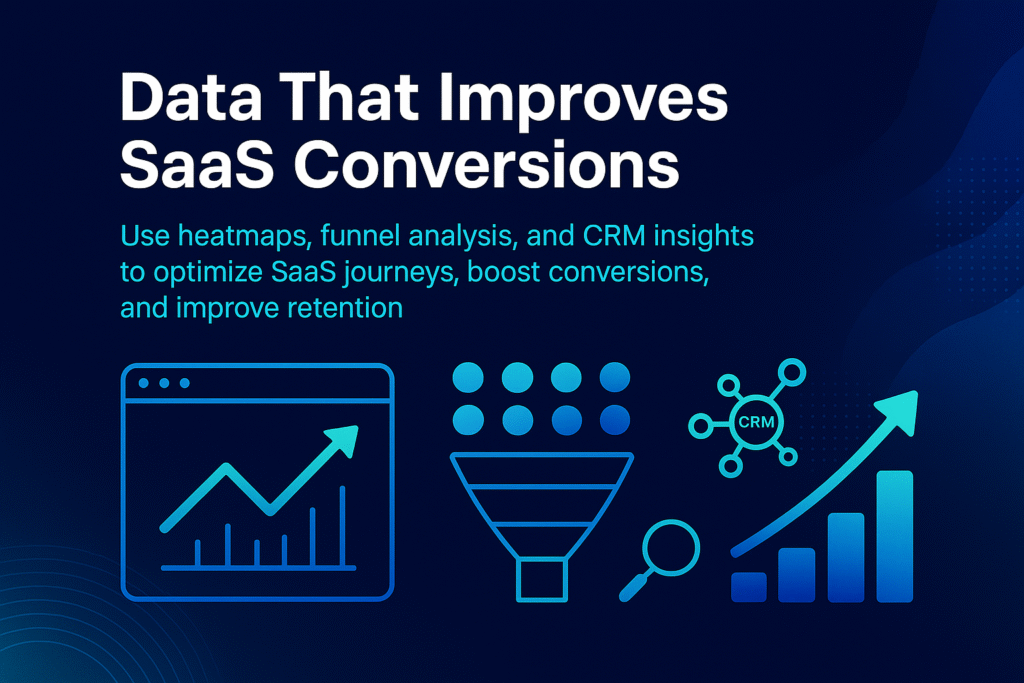
Conversion Optimization for SaaS in Seattle
Paid ads for SaaS companies in Seattle are among the fastest routes to capturing high-intent leads in 2025. In the fiercely competitive Seattle tech scene, with hubs like South Lake Union and Bellevue, precision matters. For example, the average cost-per-click across Google Ads in 2025 is around $5.26, with conversion rates climbing to an average of 7.52%, indicating that advertisers are still finding substantial value when ads are optimized.
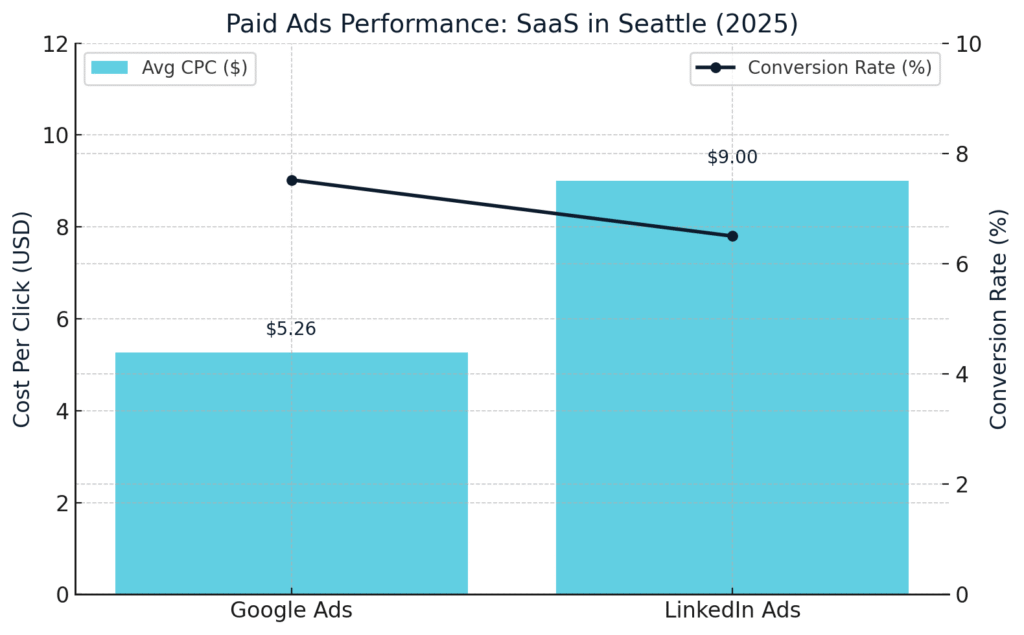
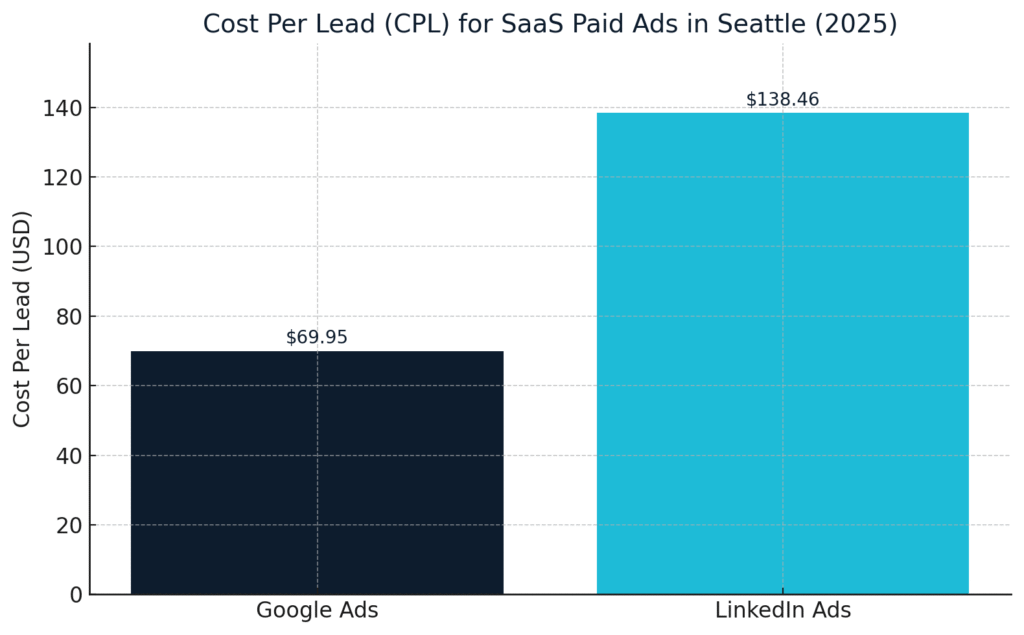
Targeted channels deliver results:
-
Google Ads help your SaaS firm appear for actionable searches like “Seattle project management software.”
-
LinkedIn Ads enable targeting by job role and industry with average CPCs between $8–$10, though they yield very high lead quality.
But cost isn’t the whole story. Retargeting and innovative bidding strategies help reduce waste. According to industry data, 65% of sectors saw better conversion rates in 2025, even as CPCs rose – proof that an innovative approach beats just chasing cheap clicks.
Well-optimized ads, clear landing pages, and tracking conversions can make paid campaigns a scalable source of SaaS growth in Seattle’s crowded market.
Measuring ROI for SaaS Marketing Campaigns in Seattle
SaaS companies in Seattle can’t afford to spend blindly on marketing in 2025. Every dollar invested in Google Ads, LinkedIn campaigns, or SEO needs to prove results. Measuring ROI isn’t just about clicks; it’s about tracking how many leads turn into paying customers and how quickly they do it.
Here are the core metrics SaaS founders must track:
-
Customer Acquisition Cost (CAC): Total spend divided by new customers acquired.
-
Lifetime Value (LTV): The projected revenue a customer brings during their relationship with your SaaS.
-
Channel Conversion Rates: Percentage of leads converting to sales from Google Ads, LinkedIn, SEO, etc.
-
Return on Ad Spend (ROAS): Revenue earned compared to ad investment.
-
Payback Period: How quickly marketing spend is recovered through customer revenue.
For example, LinkedIn Ads may cost more upfront but usually bring in higher-value accounts. SEO, on the other hand, compounds over time, lowering CAC as rankings rise.
Seattle SaaS startups should integrate CRM systems like HubSpot or Salesforce with analytics platforms to monitor attribution. This makes it easier to identify which campaigns generate a qualified pipeline versus those that bring traffic.
Another growing trend is multi-touch attribution models. Since SaaS buyers often interact with a brand through multiple channels – blog, webinar, LinkedIn ad, sales email – single-touch tracking no longer reflects true ROI.
In 2025, SaaS companies that succeed in Seattle are those that not only launch campaigns but also continuously refine them using data. ROI-focused marketing ensures budgets scale with revenue, not vanity metrics.
Customer Retention and Churn Reduction for Seattle SaaS Companies
For Seattle SaaS companies, reducing churn is just as vital as winning new customers. A 5% boost in retention can raise profits by 25–95% (Bain & Co., 2025). Retention ensures lower acquisition costs and more substantial lifetime value.
| Retention Strategy | Impact | Effort | Why It Matters |
|---|---|---|---|
| Personalized Onboarding | High | Medium | Early success drives adoption. |
| Proactive Support | Very High | High | Builds loyalty fast. |
| Feedback Loops | High | Medium | Fuels product improvements. |
Retention-focused SaaS companies in Seattle achieve steadier growth and competitive advantage.
Case Studies: Retention and Growth Strategies in Seattle SaaS
In this section, we’ll explore two Seattle SaaS companies that overcame major growth hurdles through retention-first strategies. One solved onboarding drop-offs with personalization, while the other turned customer feedback into a growth engine. Both show how focusing on users drives sustainable scaling.
Case Study: Onboarding Excellence at a Seattle SaaS Startup
A Seattle-based SaaS startup offering workflow automation faced a serious challenge – 12% churn within the first 60 days. Many new customers abandoned the product after signing up, never reaching activation milestones. After analyzing user behavior, the team realized their onboarding was too generic.
They shifted to personalized onboarding journeys. Instead of a single tutorial, users were shown product walkthroughs tailored to their industry (finance, marketing, IT) and the specific problems they aimed to solve. They implemented milestone-based checklists and set up automatic support follow-ups within the first week.
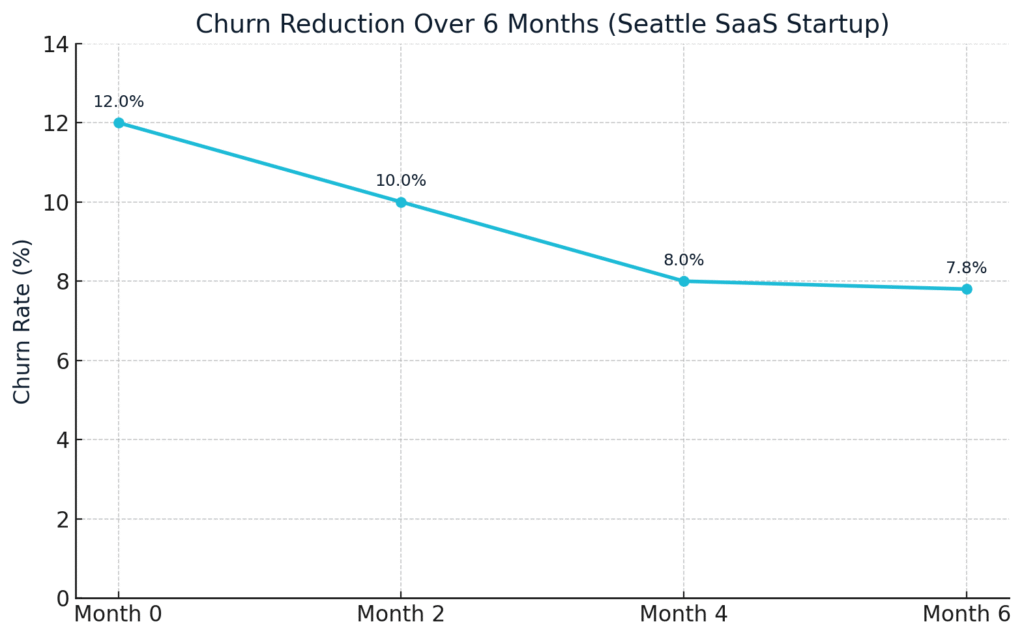
The results were dramatic. Within six months, churn dropped 35%, product adoption rose significantly, and customer satisfaction scores improved by two full points. Even more, upsell conversions increased because users were already seeing success with the core features.
This case proved that tailored onboarding is more than a welcome email – it’s the foundation of retention and revenue growth. SaaS firms in Seattle can use this approach to create customer trust from day one.
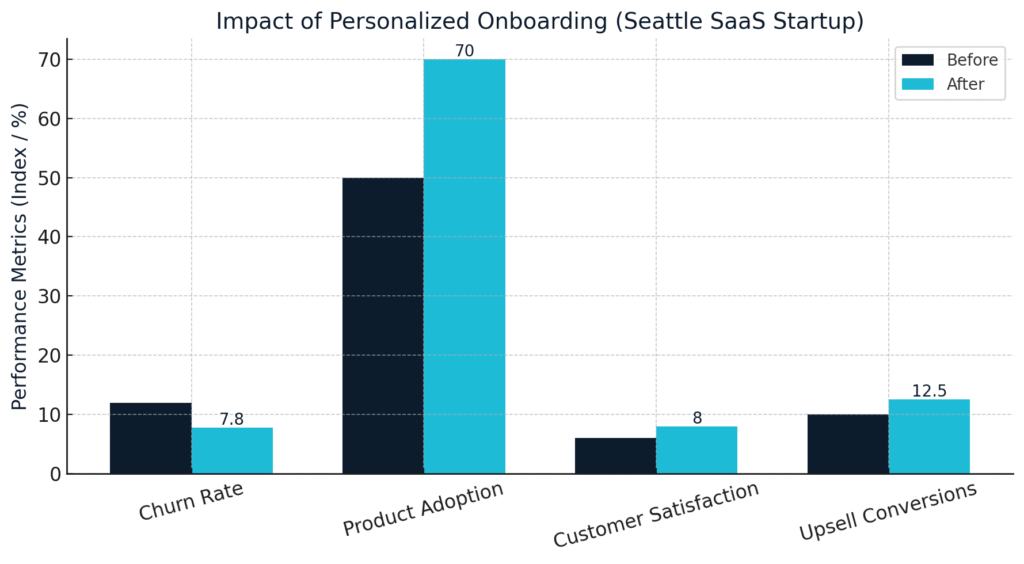
Case Study: Feedback-Driven Growth at a Seattle SaaS Provider
Another Seattle SaaS company offering analytics tools discovered that many cancellations stemmed from frustration with confusing features and unmet expectations. Instead of treating this as a cost of doing business, leadership decided to build structured feedback loops.
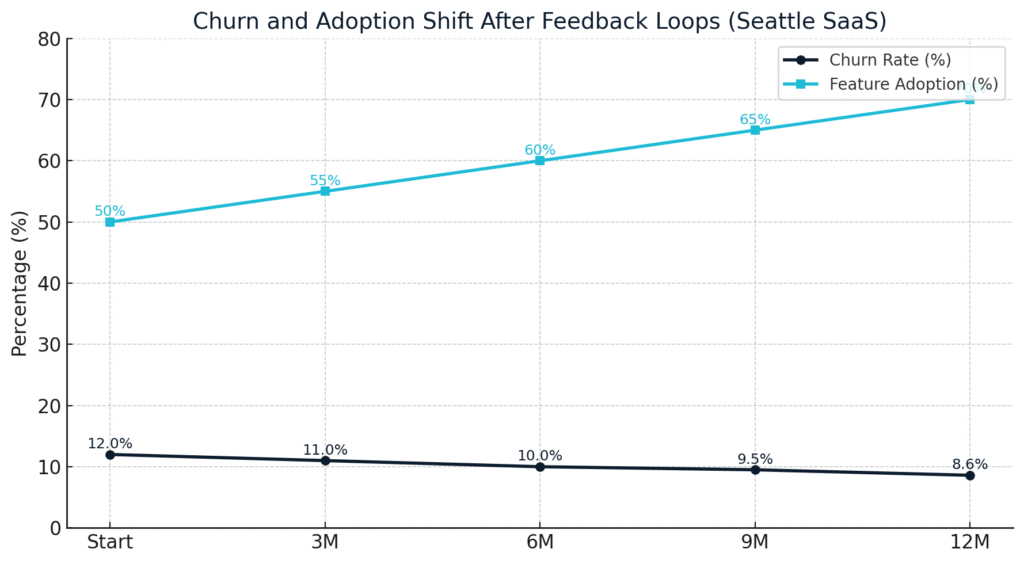
They deployed in-app surveys triggered after feature use, conducted monthly customer panels, and added a simple two-question cancellation survey. Feedback was organized by frequency and impact, then handed to the product team for prioritization. Crucially, they also closed the loop by updating customers when changes were made – highlighting “you asked, we delivered” messages in release notes.
The impact was impressive. Within a year, churn decreased by 28%, feature adoption grew by 40%, and referral signups nearly doubled. Customers felt heard, engaged more actively, and even promoted the product to peers.
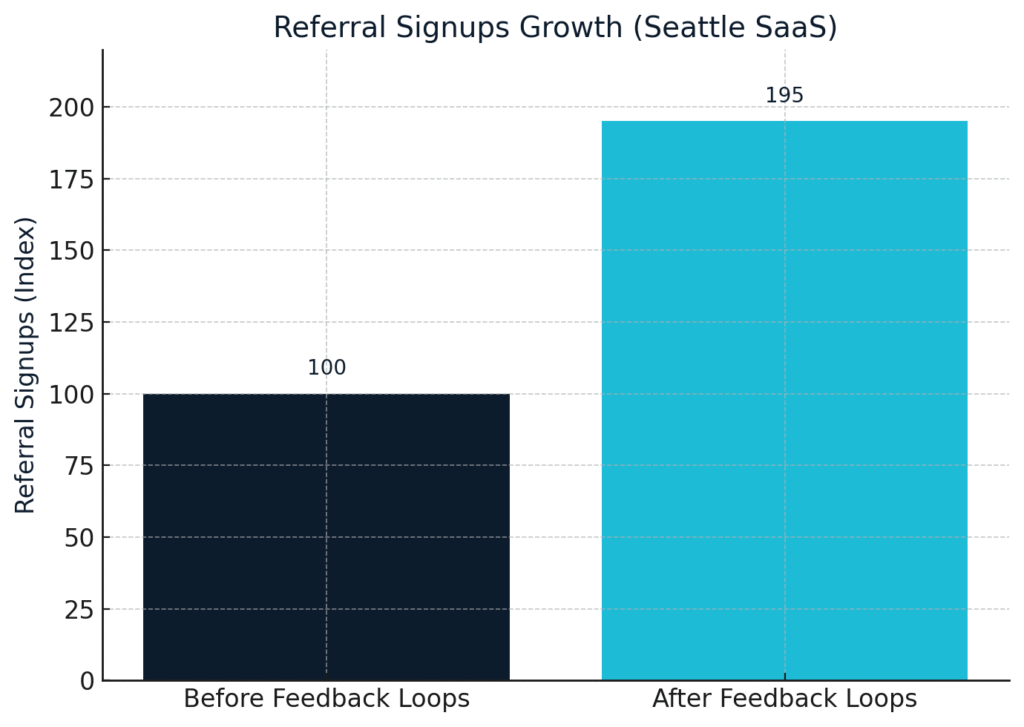
The case highlights that listening and responding quickly is a competitive advantage. SaaS providers that use feedback to drive product-market fit not only reduce churn but also generate stronger advocacy. In a crowded market like Seattle, that kind of trust is priceless.
Takeaways from the Case Studies
Both case studies highlight critical lessons SaaS companies in Seattle can apply:
-
Personalization in onboarding reduces early churn.
-
Proactive communication builds long-term loyalty.
-
Feedback loops drive continuous product-market fit.
-
Showing customers their input shapes the product creates advocates.
-
Retention strategies can also fuel referrals and upsells.
Should Seattle SaaS Companies Manage Marketing Alone or Hire an Agency?
SaaS companies in Seattle face a significant decision in 2025: whether to manage marketing in-house or partner with a SaaS marketing agency. Both approaches have strengths, but the right choice depends on resources, speed, and growth goals. Search intent shows many founders ask, “Is DIY SaaS marketing enough?” or “Should I hire a SaaS growth agency in Seattle?” Let’s break it down!
| Factor | Doing Marketing In-House | Partnering with a SaaS Marketing Agency |
|---|---|---|
| Cost Control | Lower direct costs but requires hiring staff, tools, and training. | Agency fees, but bundled expertise saves on staffing and mistakes. |
| Expertise | Limited to team’s experience; steep learning curve for SEO, PPC, ABM. | Specialized experts in SaaS SEO, paid ads, and automation. |
| Speed to Market | Slower campaigns due to trial-and-error. | Faster execution with proven frameworks and ready-to-launch strategies. |
| Scalability | Harder to scale fast with small teams. | Agencies scale campaigns quickly as budgets or markets expand. |
| ROI Tracking | May lack advanced analytics and attribution setup. | Full funnel tracking, dashboards, and ROI optimization built-in. |
In-house teams offer control and flexibility, but they often struggle with scaling and technical depth. Agencies, like aboveA, bring proven SaaS growth playbooks, faster implementation, and better ROI tracking – critical for competing in Seattle’s fast-moving SaaS landscape.
For SaaS founders seeking to scale lead generation, boost retention, or enter new markets, agencies offer the expertise and bandwidth to achieve these goals without guesswork.
Conclusion
While Seattle SaaS companies can manage marketing in-house, most struggle with speed, expertise, and scaling. Agencies like aboveA bring proven SaaS growth strategies, advanced analytics, and faster execution, ensuring every marketing dollar drives real ROI. For startups aiming to grow fast and compete with bigger players, agency support often delivers stronger results than DIY efforts. The choice comes down to whether you want to experiment slowly or accelerate growth with experts.
Meet the Author

Faustas Norvaisa
A Growth & Product Expert with 9 years of experience in revenue diversification, international expansion, SEO, and digital marketing. Passionate about scaling businesses and building global brands, he empowers companies to thrive with his motto, "sharing is caring.
